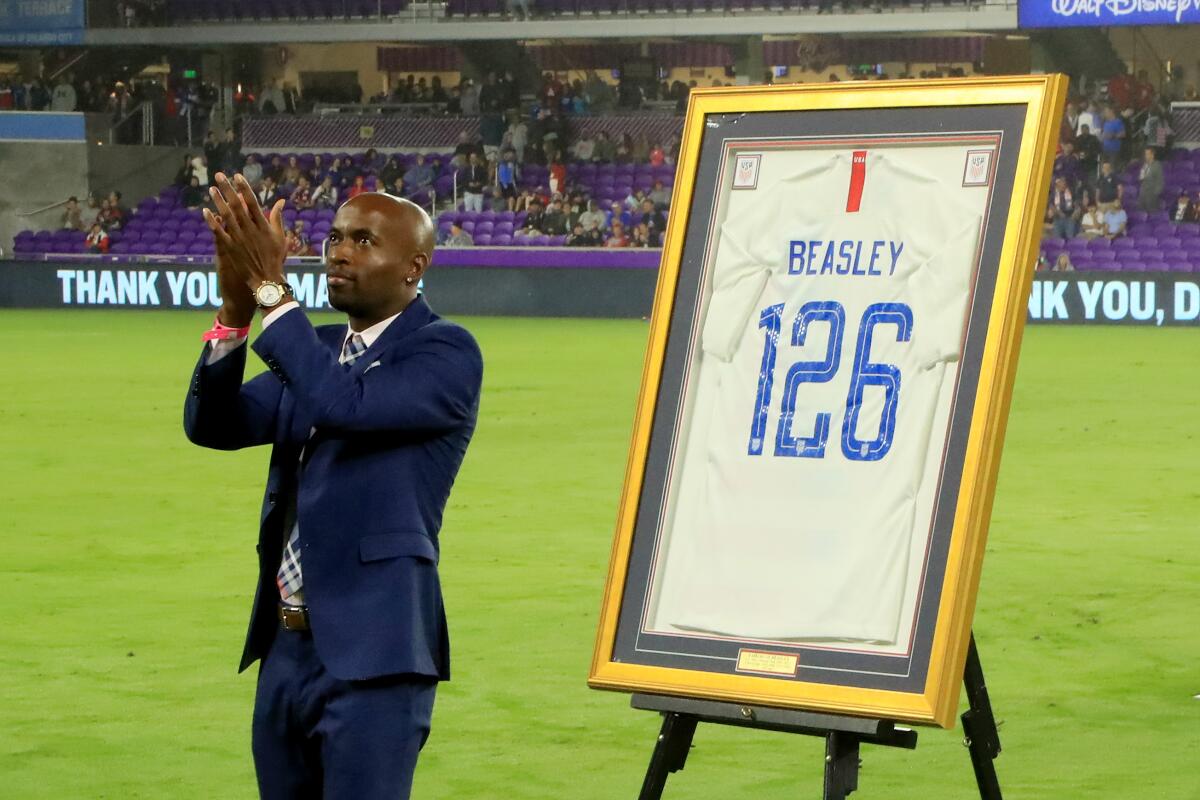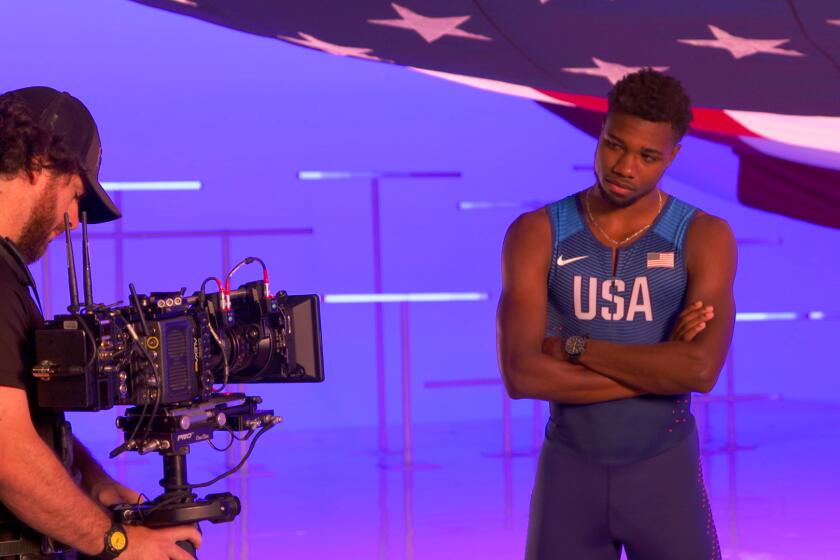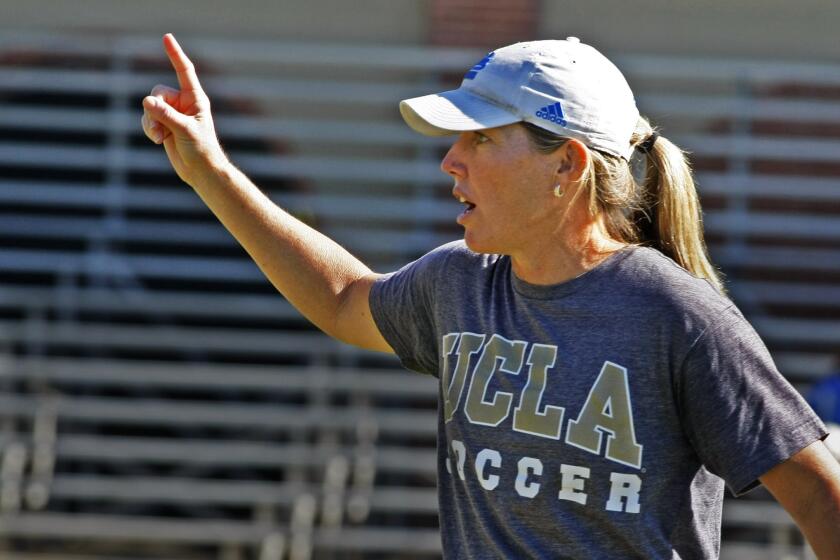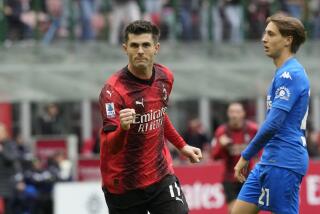Soccer world’s struggle with racism seems never ending

- Share via
The headline in the tabloid newspaper Corriere dello Sport landed like a thud.
“Black Friday,” it read in capital letters, between photos of Roma defender Chris Smalling and Milan forward Romelu Lukaku. It was meant to preview Friday’s Serie A match between the two former Manchester United teammates, which ended in a scoreless draw.
Instead, it ripped open fresh wounds.
Italian soccer has long been sullied by vile racism. This season that has been taken up a notch with Lukaku targeted for verbal abuse by fans in Cagliari, a match in Parma suspended when racist chants were heard coming from the crowd, a TV commentator dismissed for saying of Lukaku “the only way to [stop] him is maybe give him 10 bananas” and Roma banning a fan for life after he racially abused Brazilian defender Juan Jesus on social media.
And that was just September.
NBCUniversal will air 7,000 hours of programming from the 2020 Tokyo Olympics over multiple platforms. Promoting that coverage has already begun.
Two months later, Brescia’s Mario Balotelli threatened to leave the field after racist chants were directed at him in Verona, an incident Brescia president Massimo Cellino later appeared to minimize by saying of Balotelli, who has suffered repeated racist attacks in his native Italy: “What can I say? That he’s black and he’s working to whiten himself, but he has great difficulties in this.”
The team said Cellino, whose club is in last place, made the comments in jest. But former U.S. national team players DaMarcus Beasley and Oguchi Onyewu, both targets of racial taunts while playing in Europe, failed to see the humor.
“It hurts,” said Beasley, who retired this fall after playing in a record-tying four World Cups. “At the end of the day, we’re people. We’re human beings.
“It hurts that people see you in a different light just because of the color of your skin.”
Onyewu was equally as troubled.
“We’re almost 2020 now, and the fact that this is actually still an issue in a progressive world, I’m without words,” he said. “It shouldn’t be accepted and it shouldn’t be tolerated.”
But it’s still happening.
During Saturday’s Premier League game in Manchester, video on social media captured a City supporter who appeared to be making racist gestures toward a Manchester United player.
In October, a Manchester United supporter was ejected after making racist comments during a game with Liverpool, one of several incidents that have marred English soccer this season.

Beasley was first subject to abuse 15 years ago, while playing in a Champions League qualifying match for Dutch club PSV Eindhoven in Belgrade, where fans mocked him with monkey chants.
Three years later, while playing for Glasgow in a Champions League qualifier in Montenegro, fans made monkey noises every time Beasley or Guyanese teammate Jean-Claude Darcheville touched the ball.
“It’s so hard to act like you don’t hear it,” Beasley said. “It’s definitely not something you forget. It was 12 years ago, and I remember it like it was yesterday.
“Forget the game, forget the results, forget being a soccer player. The hardest [thing] is that it actually happened.”
Onyewu was also abused repeatedly, the most severe incident coming in a 2009 match between Belgium clubs Standard Liege and Anderlecht. Onyewu said Anderlecht’s Jelle Van Damme — who later played two seasons for the Galaxy — used racial slurs and called him “a dirty monkey” three times. Incensed, Onyewu sued, then settled out of court when Van Damme apologized publicly.
On another occasion, Onyewu said he was preparing for a throw-in when a fan reached out “and just clocked me.”
“I look at the referee and he’s telling me to play on as if I’m the one that’s crazy. Like ‘Oh, get on with it. It’s just nothing,’ ” he said. “That’s a privilege to them that they don’t have to go through it. But the people that have lived it, they understand the severity of an experience like that.”
The UCLA women’s soccer team scored the first goal but was outplayed the rest of the way in a 4-1 loss to Stanford in an NCAA soccer semifinal.
In Italy, “the rot is deep,” according to Piara Powar, executive director of FARE, European soccer’s antidiscrimination watchdog.
“They have failed to protect countless players from racism over the past year and have no meaningful response to the endemic racism in stadiums,” Powar told the BBC. “No one is taking the issue seriously.”
That may be starting to change. Ten days ago, Milan and Roma persuaded the 20 Serie A clubs to sign an open letter in which they publicly admitted Italian football has a chronic racism issue and called on the league deliver a comprehensive and robust antiracism policy, stricter laws and a plan for educating those within the game about the scourge of racism.
“Italian football has been soft on racism for far too long, and that is not something we are prepared to accept any more,” said Paul Rogers, chief strategy officer for Roma. “In 2019, it shouldn’t need a football club to tell anyone that making monkey noises or racist comments to black players is unacceptable.”
A week later Corriere dello Sport proved just how difficult a fight Rogers and Roma have on their hands.









